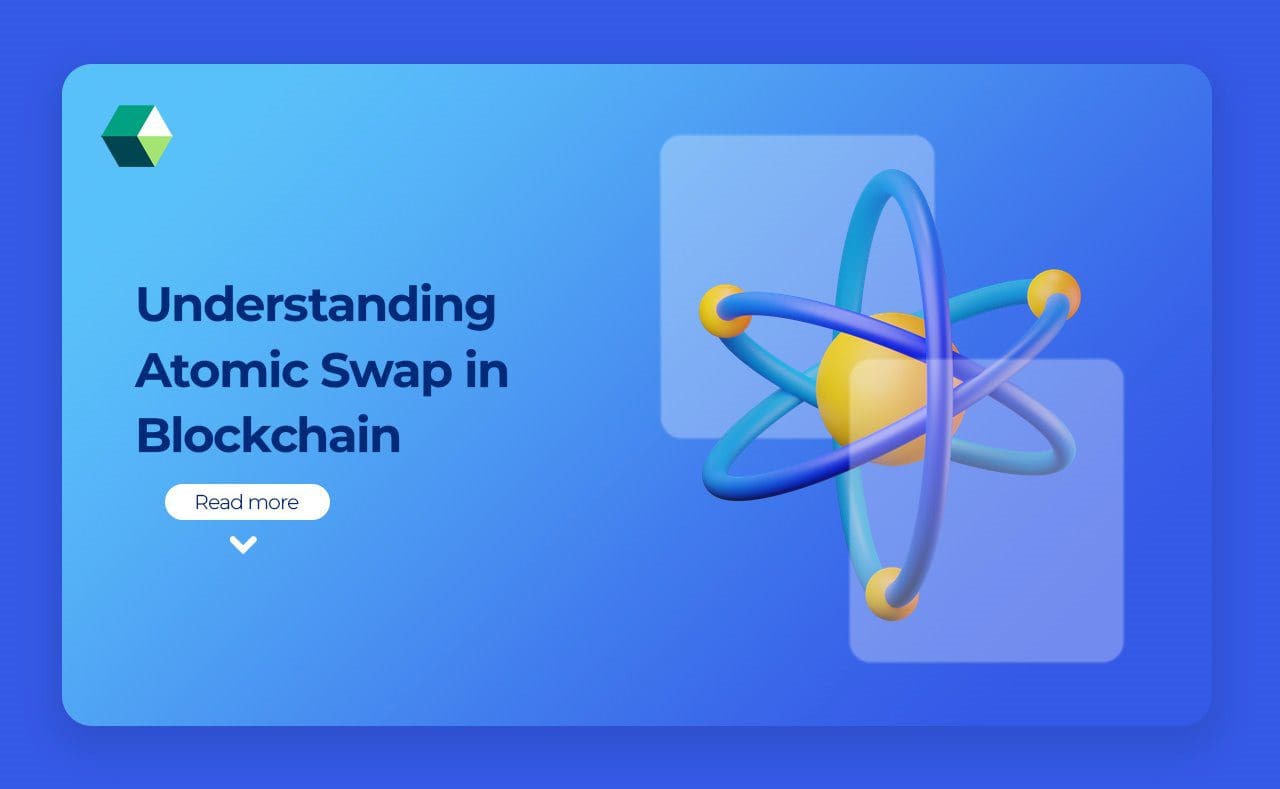Atomic Swaps, also known as Cross-Chain Swaps, enable the exchange of cryptocurrencies from different blockchains directly between users, without the need for a trusted third party. They offer a way to facilitate peer-to-peer exchanges of cryptocurrencies without the need for intermediaries. This technology is especially significant for those engaged in blockchain development and consulting, as it provides a robust framework for decentralized transactions. Atomic swaps are facilitated through Hash Time-Locked Contracts (HTLCs). HTLCs are smart contracts that use Cryptographic Hashes and time locks to secure the transaction.
What is An Atomic Swap in Blockchain?
An atomic swap is a Smart Contract Technology that enables the direct exchange of cryptocurrencies between different blockchains without the need for an intermediary. This process is executed using Hash Time-Locked Contracts (HTLCs), which ensure that both parties in the transaction meet their obligations simultaneously. If the conditions are not met within a specified time frame, the transaction is canceled, and assets are returned to their original owners.
For a Blockchain Development Company, understanding and implementing atomic swaps can be highly advantageous. This technology enhances the security and efficiency of cross-chain transactions by eliminating the need for centralized exchanges and minimizing counterparty risk. By integrating atomic swaps, blockchain development companies can provide innovative solutions that support decentralized and trustless exchanges of digital assets across various blockchain networks.
How Do Atomic Swaps Work?
Atomic swaps work through the use of Hash Time-Locked Contracts (HTLCs) to facilitate direct, peer-to-peer exchanges of cryptocurrencies across different blockchains. The process begins when two parties agree to trade assets. Each party creates a unique cryptographic hash and a time-lock period, which forms the basis of the HTLC. The hash serves as a secret code that both parties need to access their respective assets, while the time-lock ensures that the transaction must be completed within a specified timeframe. During the swap, Blockchain Development Services often incorporate atomic swaps to enhance the functionality of their solutions. This approach not only streamlines the trading process but also aligns with the principles of decentralization and truthfulness that are fundamental to blockchain technology.
Benefits of Using Atomic Swaps
-
Decentralization
Atomic swaps eliminate the need for intermediaries or centralized exchanges, allowing users to trade directly between different cryptocurrencies while maintaining a decentralized network structure.
-
Enhanced Security
By using Hash Time-Locked Contracts (HTLCs), Blockchain Atomic Swaps ensure that both parties fulfill their part of the transaction or neither does, reducing the risk of fraud and counterparty risk.
-
Cost Efficiency
Since atomic swaps bypass Centralized Exchanges and associated fees, users can save on transaction costs and trading fees, making cross-chain trading more economical.
-
Privacy
Atomic swaps offer a higher level of privacy compared to traditional exchanges, as they do not require users to disclose personal information or complete lengthy verification processes.
-
Seamless Trading
Atomic swaps enable smooth and direct exchanges of cryptocurrencies across different blockchains, streamlining the trading process and providing a more efficient way to manage digital assets.
Can Atomic Swaps Be Used For Any Cryptocurrency?
Atomic swaps can potentially be used with any cryptocurrency that supports the underlying technology of Hash Time-Locked Contracts (HTLCs) and has compatible scripting capabilities. While major cryptocurrencies like Bitcoin and Ethereum are commonly used due to their support for HTLCs, other digital assets may also be integrated with atomic swaps, provided they meet the technical requirements. Blockchain Consulting Solutions are essential for expanding the use of atomic swaps to a broader range of cryptocurrencies. These solutions help businesses and developers understand the technical nuances, ensure compatibility, and implement effective atomic swap protocols. This enhances cross-chain trading and leveraging the full potential of decentralized exchange technologies.
Security Risks Associated With Atomic Swaps
One significant concern is the potential for smart contract vulnerabilities. If the code governing the Hash Time-Locked Contracts (HTLCs) contains bugs or weaknesses, it could be exploited by malicious actors, leading to the loss of assets. Another risk involves the necessity for both parties to trust the integrity of the blockchain networks involved. If one network is compromised or suffers from a security breach, it can impact the safety of the atomic swap process.
Blockchain Consulting Services help reduce risks by offering expert support for creating and checking smart contracts used in atomic swaps. They make sure HTLCs are strong and free from weaknesses, give advice on best practices for secure use, and help solve any problems during the swap. By focusing on Blockchain Atomicity, they ensure transactions are complete and secure. Using these services, businesses can make their atomic swaps safer and better protect their assets.
Examples Of Successful Atomic Swap Implementations
-
Bitcoin and Litecoin Swap
One of the first notable atomic swaps occurred between Bitcoin and Litecoin. This successful implementation demonstrated the feasibility of Cross-Chain Swaps between two major cryptocurrencies, showcasing how atomic swaps can facilitate direct and secure exchanges without intermediaries.
-
Decred and Bitcoin Swap
The integration of Decred and Bitcoin through atomic swaps allowed users to trade these two cryptocurrencies seamlessly. This implementation highlighted the effectiveness of atomic swaps in enabling interoperability between different blockchain networks.
-
Komodo and Bitcoin Swap
Komodo’s Decentralized Exchange (DEX) Platform utilized atomic swaps to enable users to trade Bitcoin and Komodo directly. This case illustrated how atomic swaps can enhance the functionality of DEX platforms and provide users with a decentralized trading experience.
-
Ethereum and ERC-20 Tokens Swap
Atomic swaps have also been successfully executed between Ethereum and various ERC-20 Tokens. This implementation demonstrated how atomic swaps can be used within the Ethereum ecosystem to facilitate direct exchanges between Ethereum and its tokens.
Future Outlook For Atomic Swaps
The future of atomic swaps looks promising as the technology continues to evolve and gain traction within the cryptocurrency and blockchain communities. As more cryptocurrencies adopt the necessary technical standards and enhancements are made to smart contract protocols, atomic swaps are expected to become more widespread and versatile. This will facilitate increasingly seamless and secure cross-chain transactions, reducing reliance on centralized exchanges and fostering greater decentralization. Custom Blockchain Development Services will be instrumental in shaping this future by providing tailored solutions that enhance the functionality and security of atomic swaps. These services will support the development of advanced smart contracts, integration with a broader range of cryptocurrencies, and optimization of swap processes to address emerging needs and challenges.
Why Choose Nadcab Labs For Atomic Swaps?
Choosing Nadcab Labs, as a leading Blockchain Consulting Company for atomic swap solutions ensures you benefit from cutting-edge technology and expert guidance. They provide comprehensive services that address all aspects of atomic swap implementations. With a team of experienced developers and consultants, they offer tailored solutions that enhance the efficiency, security, and scalability of atomic swaps across different blockchain networks. Their expertise in designing and deploying robust smart contracts, combined with a deep understanding of cross-chain interoperability, makes them a valuable partner. They work closely with clients to customize atomic swap protocols to meet specific needs, ensuring seamless and secure transactions.







